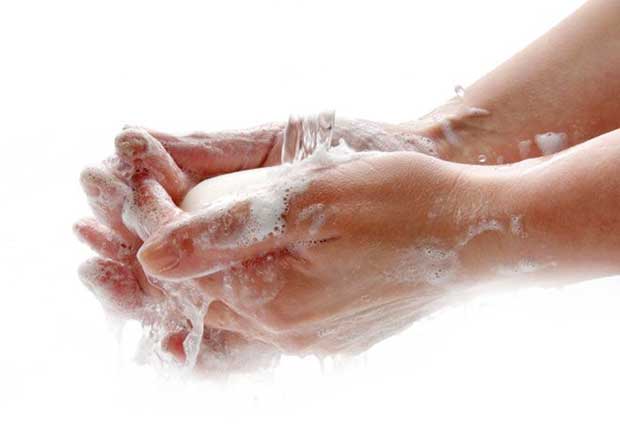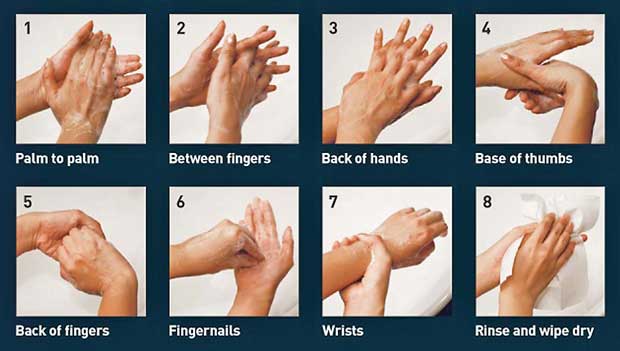31 May 2017 - {{hitsCtrl.values.hits}}

 People these days are too busy to remember to wash their hands, believing there will be no drastic consequences. However according to Dr. Kushlani Jayatilleke, Consultant Microbiologist at the Sri Jayawardanapura General Hospital, maintaining good hand hygiene can stop the spread of infections and antibiotic-resistant bacteria.
People these days are too busy to remember to wash their hands, believing there will be no drastic consequences. However according to Dr. Kushlani Jayatilleke, Consultant Microbiologist at the Sri Jayawardanapura General Hospital, maintaining good hand hygiene can stop the spread of infections and antibiotic-resistant bacteria.
“We make a lot of contact with our hands. Whenever we handle something, we handle it with our hands. So there’s a higher chance of contaminating one’s hands and there’s a higher chance of contaminating and spreading micro-organisms to somebody else through our hands,” said Dr. Jayatilleke
She further said, “Maintenance of good hand hygiene is important in order to prevent the spread of infections. Many infections are transmitted through the hands. Infections are caused by micro-organisms. Some people may not have an apparent infection, which means they’re not sick but they still they may harbour micro-organisms, especially bacteria, which can sometimes be harmful to other people.”

Speaking of places where infections and bacteria can easily spread she said, “When you visit patients in hospital or if you come to get treatment, be very careful. It’s not only the fact that people with infections are everywhere in hospitals but that there is antibiotic resistance. This means that bacteria and other micro-organisms develop a resistance to antibiotics and other drugs which we are using to treat people. Thus these drugs will not be effective any longer because the bacteria’s genes are changing. This is more so in hospitals. So when going to the hospital, we must be aware of this. Such bacteria can be found on people’s or the patient’s skin, beds and other environments in the hospital.”
Citing that antibiotic resistance was a major problem in the world today, Dr. Jayatilleke said, “ This year the theme for Global Hand Hygiene Day held on March 5 was “Fight Antibiotic Resistance, It’s In Your Hands”.
“Hand hygiene is very very important, especially for health staff and health care workers. When they touch a patient they should not touch another without first cleaning their hands. That’s the requirement. Sometimes they forget when they’re busy, so this is what we are trying to practice and advocate,” she added.
She said infections too could be spread through the hands. “Antibiotic-resistant bacteria can be transmitted from one person to another through hands. Infections are more likely to spread in a community setting. For example influenza, which is a respiratory infection. At times it can be severe and can even result in the death of a patient when they have an immunity problem. Prevention is important, because treatment-wise we don’t have much, we have a few drugs but those may not be effective because resistance is developing against these.”
She further said, “Although it’s a respiratory infection, when you sneeze and cough into your hands, you can contaminate your hands and if you shake hands with another person, you can transfer the virus to them. Therefore even in respiratory infections, hands hygiene is important. It’s better to use a tissue and discard it immediately. We also recommend you to use your upper arm when coughing and sneezing so that transmission is less as contact with the hand is less.”
“There are other infections like gastrointestinal infections including diarrhoea. For example, if you have loose motion and go to the toilet and don’t clean your hands properly, the organisms can remain in your hand. These intestinal infections can be transmitted to another person if you don’t wash your hands and you can even contaminate your food,” she added.

Speaking of hand hygiene at home she said, “At home, infections or infective agents like bacteria can be transmitted from things like food. Especially through raw food such as meat and greens. From how we clean and cook our food in Sri Lanka, we can kill the bacteria. But if you don’t wash your hands properly after you prepare the food and if you eat with the contaminated hand, you can get the infection. So it is important to clean and wash your hands after preparation and after touching raw food.”
Dr. Jayatilleke further said the methods used to maintain proper hand hygiene too was important. “There are two ways of maintaining this. One is washing your hands with soap and water. It is better to use liquid soap over cake soap. When using a cake of soap, there’s a higher chance for contamination. You need to keep it in a proper soap tray where the water will be drained, otherwise the water will be a culture medium for bacteria. It’s important to keep the soap dry. When using liquid soap, there’s a lower chance of contaminating the bottle. You also need to dry your hands properly. If you have a towel, the chances of contamination are higher if it is not washed properly. So it is better to use a single-use tissue or a clean, dry towel. Secondly, you can use an alcohol-based hand sanitizer which is equally as good as washing your hands with soap and water. It is user-friendly and accessible. It is also important to use it in supermarkets because when buying raw meats and vegetables, you can contaminate your hands with the micro-organisms on the surface.”
“In order to prevent the spread of infection and antibiotic-resistant bacteria, it is important to maintain good hand hygiene,” she concluded.
23 Dec 2024 8 hours ago
23 Dec 2024 23 Dec 2024
23 Dec 2024 23 Dec 2024
23 Dec 2024 23 Dec 2024